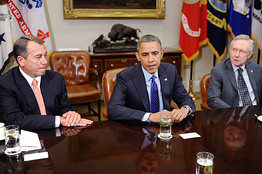This Unserious White House
The president makes the GOP a fiscal-cliff offer he knows they will refuse.
By Kimberly Strassel
WSJ.com
The White House this week finally explained just how serious it is about averting a fiscal cliff that could throw the country back into a recession. The answer: not serious at all.
The markets and the media in recent days have been operating on an optimistic belief that the administration simply will not let the country fall off the fiscal cliff. They'd best rethink. On Thursday, the president dispatched Treasury Secretary Tim Geithner and White House Director of Legislative Affairs Rob Nabors to Congress to finally outline the White House's offer to avert the coming tax hikes and sequester.
It was something out of Wonderland and Oz combined.
According to sources on Capitol Hill, the White House wants Republicans to pony up $960 billion in immediate tax increases, which will come from hiking the top marginal rates and increasing capital gains and dividends taxes. That is just for starters. The administration also wants the GOP to surrender an additional $600 billion in revenue via later tax reforms.
The president's team specified no amounts or details on spending cuts. Rather, the White House wants more spending: at least $50 billion in new stimulus, an extension of unemployment insurance, a one-year deferral of the sequester, new money to refinance underwater mortgages, a Medicare-doctor fix . . . and a partridge in a pear tree.
Oh, the White House also wants Congress to give Mr. Obama the authority to increase the debt limit, whenever he wants, as much as he wants.
What do Republicans get in return? Next year, the White House will agree to talk to the GOP about cutting as much as $400 billion from entitlement programs. Maybe. If Democrats get around to it. Which they won't—because they'll have everything they've wanted.
How to put this tax-and-more-spending offer in perspective? It is far in excess of what the Democrats asked for in last year's debt-limit standoff—when the political configuration in Washington was exactly the same. It is far more than the president's own Democratic Senate has ever been able to pass, even with a filibuster-proof majority. It is far more than the president himself campaigned on this year.
But the president's offer is very much in keeping with his history of insisting that every negotiation consist of the other side giving him everything he wants. That approach has given him the reputation as the modern president least able to forge a consensus.
Don't forget: The man now engaged with Congress to work out a grand deal is the same one who could not pull over to his side a single Republican vote for his stimulus legislation, who had to ram through ObamaCare with procedural tricks, and whose inept handling of last year's debt-ceiling talks ultimately led his fellow Democrat, Senate Majority Leader Harry Reid, to isolate him from the final negotiations. This is not a history to inspire confidence.
Mr. Obama's tendency to campaign rather than lead, to speechify rather than negotiate, has already defined this lame-duck session. The president has wasted weeks during which a framework for a deal has been in place.
Within two days of the election, Mr. Boehner had offered an enormous compromise, committing the GOP to provide new tax revenue, through limits on deductions for the wealthy. Mr. Obama campaigned on making "the rich" pay more—and that is exactly what Mr. Boehner agreed to give him.
All that was left for the president to do was accept this peace offering, pair it with necessary spending cuts, and take credit for averting a crisis. Mr. Obama has instead spent the past weeks campaigning for tax-rate hikes. He wants the revenue, but collected only the way he chooses. And on the basis of that ideological insistence alone, the nation is much closer to a crisis.
Talks that had been at a standstill may now crumble, thanks to the Geithner-Nabors proposal. The president is boxing in the Republicans—offering them a deal they cannot accept, a deal they can't even be seen to be treating seriously. Mr. Boehner is legitimately interested in a bargain that will set the country on sounder footing. Yet the most immediate outcome of such an open slap from the White House will be to make even those Republicans who were willing to cut a deal harden their positions. Someone get the White House a copy of "Negotiating Tactics for Dummies."
Then again, the most frightening aspect of the White House proposal is that it wasn't an error. Perhaps the proposal was thoroughly calculated. This suggests a president who doesn't care about the outcome of the cliff negotiations—who thinks that he wins politically no matter what. He's betting that either the GOP will be far more responsible than he is and do anything to avert a crisis, or that the cliff gives him the tax hikes his partisans are demanding. Win-win, save for the enormous pain to average families across the country.
The Republicans will have to contemplate how to deal with such an unserious offer. But in presenting his demands, the president has now made very clear that there is only one side that is working in good faith.
Write to kim@wsj.com


